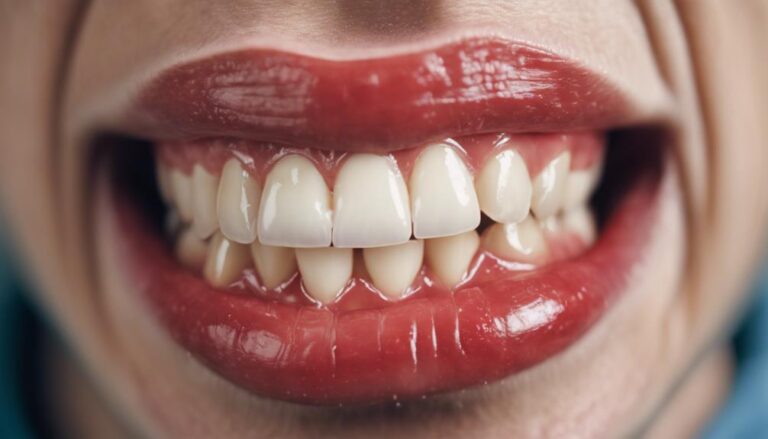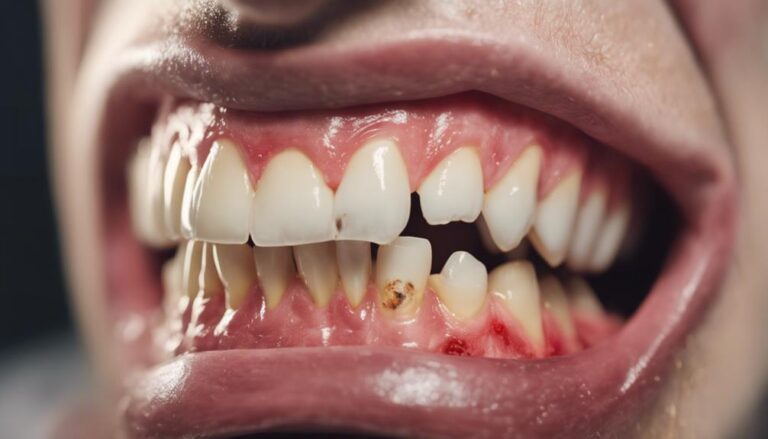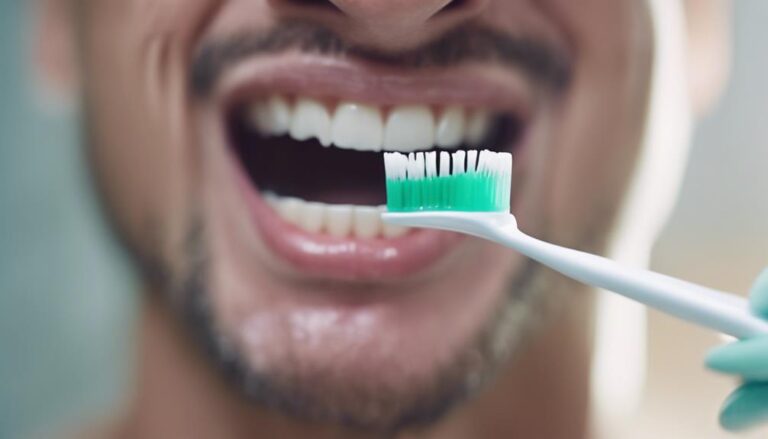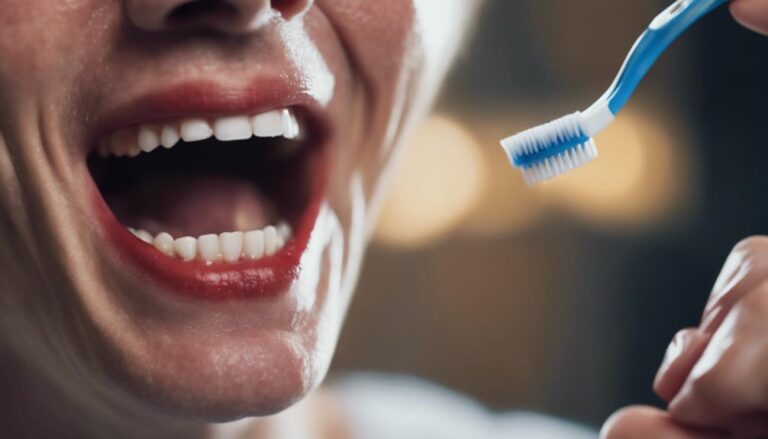Gum disease treatment plays a crucial role in combating bad breath. Addressing gum disease through professional cleanings and procedures like scaling and root planing helps eliminate bacterial build-up causing halitosis. Regular dental check-ups aid in early detection and intervention, preventing complications. Antibacterial mouthwash and guided tissue regeneration are effective in managing gum disease and bad breath. Lifestyle changes, dietary modifications, and ongoing care further enhance oral health. Understanding the connection between gum disease treatment and bad breath is essential for overall well-being and fresh breath. Additional insights can provide a deeper understanding of effective solutions.
Key Takeaways
- Gum disease treatment like scaling and root planing can alleviate bad breath by removing bacteria.
- Professional cleanings and deep cleaning procedures target bacterial build-up for fresher breath.
- Antibacterial mouthwash recommended post-treatment aids in reducing bacteria causing bad breath.
- Guided tissue regeneration in severe cases helps in healing and preventing bad breath.
- Combining at-home care with professional treatments effectively tackles bad breath in gum disease.
Importance of Gum Disease Treatment
Understanding the importance of gum disease treatment is essential for maintaining oral health and overall well-being. Gum disease, also known as periodontal disease, is a common condition that can lead to serious complications if left untreated. As a proponent of oral hygiene, I emphasize the significance of preventive care in managing gum disease.
Effective gum disease treatment not only addresses the immediate symptoms like bleeding gums, bad breath, and gum recession but also prevents further progression of the disease. Regular dental check-ups and cleanings play an important role in early detection and intervention. By practicing good oral hygiene habits such as brushing, flossing, and using antiseptic mouthwash, individuals can reduce the risk of developing gum disease.
Research has shown a strong association between gum disease and systemic health conditions like heart disease and diabetes. Therefore, prioritizing gum disease treatment isn’t only beneficial for oral health but also for overall well-being. Taking proactive steps to address gum disease through professional dental care and diligent oral hygiene practices is paramount in preserving a healthy smile and a healthy body.
Causes of Bad Breath in Gum Disease
One of the key factors contributing to bad breath in gum disease is the build-up of bacteria in the pockets formed between the teeth and gums. These bacteria release volatile sulfur compounds, leading to the unpleasant odor associated with halitosis. Maintaining good oral hygiene is vital in preventing this bacterial overgrowth. Inadequate brushing and flossing allow plaque to accumulate, providing a breeding ground for these foul-smelling bacteria. Additionally, poor oral hygiene can exacerbate gum disease, leading to further bacterial proliferation and worsening bad breath.
When gum disease is present, the inflamed gum tissue creates an environment where bacteria thrive, perpetuating the cycle of halitosis. Regular dental check-ups and professional cleanings are essential to remove plaque and tartar that regular brushing may miss, reducing the bacterial load in the mouth. Addressing underlying gum disease through treatments like scaling and root planing can greatly improve bad breath by eliminating the source of bacteria.
Professional Dental Cleaning
Professional dental cleanings play a crucial role in maintaining oral health and preventing the progression of gum disease. When combined with good oral hygiene habits, such as proper brushing and flossing techniques, regular cleanings can greatly reduce the risk of gum disease and bad breath. During a professional dental cleaning, a dental hygienist will remove plaque and tartar buildup that can’t be effectively addressed through regular brushing and flossing alone. This thorough cleaning helps to prevent inflammation of the gums, which is a common precursor to gum disease.
Furthermore, professional cleanings reach areas in the mouth that are difficult to clean at home, ensuring a more thorough removal of bacteria and debris. Maintaining a schedule of dental cleanings as recommended by your dentist is essential for long-term oral health. By complementing these cleanings with proper oral hygiene practices, individuals can effectively combat bad breath and reduce the risk of developing gum disease.
Scaling and Root Planing
To effectively address advanced cases of gum disease and combat persistent bad breath, scaling and root planing is an essential periodontal treatment. This deep cleaning procedure is typically performed by a dental professional to remove plaque and tartar from below the gumline, where regular brushing and flossing can’t reach. Scaling involves scraping off the tartar from the teeth and roots, while root planing smoothens the root surfaces to promote gum reattachment and prevent further bacterial growth.
Maintaining proper flossing techniques and oral hygiene practices is important in preventing gum disease and tooth decay, but in cases where these conditions have already progressed, scaling and root planing play a significant role in restoring gum health. This procedure not only helps in reducing inflammation and eliminating harmful bacteria but also aids in controlling bad breath caused by untreated gum disease.
Antibacterial Mouthwash Recommendations
When seeking effective solutions to combat gum disease and bad breath, incorporating antibacterial mouthwash into your oral care routine can be highly beneficial. Antibacterial mouthwashes are formulated to reduce the bacteria in your mouth, helping to prevent gum disease and alleviate bad breath. When choosing an antibacterial mouthwash, look for ingredients like chlorhexidine, cetylpyridinium chloride, or essential oils such as tea tree oil or eucalyptus, which have been shown to be effective in combating harmful bacteria.
Additionally, natural remedies like oil pulling with coconut or sesame oil can also provide antibacterial benefits for your mouth. Tongue scraping is another useful practice to remove bacteria from the surface of your tongue, further reducing the chances of bad breath.
It is important to follow the instructions on the mouthwash label for the recommended duration of use and frequency. Incorporating antibacterial mouthwash into your daily oral care routine, along with regular brushing, flossing, and dental check-ups, can contribute to healthier gums and fresher breath.
Laser Therapy for Gum Disease
Utilizing laser therapy as a cutting-edge treatment modality can effectively target and address gum disease with precision and minimal invasiveness. Laser technology advancements have revolutionized gum disease treatment by offering enhanced precision and reduced recovery times. The laser energy can selectively remove diseased tissue while sterilizing the area, promoting better healing outcomes. Patients undergoing laser therapy for gum disease often experience less bleeding, swelling, and discomfort compared to traditional methods.
Moreover, laser therapy can also aid in pain management strategies. The heat generated by the laser can help seal nerve endings, reducing post-operative discomfort. Additionally, the minimally invasive nature of laser treatment contributes to faster healing times, allowing patients to resume their daily activities sooner.
Studies have shown promising treatment success rates with laser therapy for gum disease. Patients report improved outcomes, including reduced pocket depths and enhanced gum health. Embracing laser technology in gum disease treatment can lead to better patient outcomes and a more comfortable treatment experience.
Surgical Treatments for Severe Cases
Surgical treatments play an essential role in managing severe cases of gum disease, providing targeted interventions to address advanced stages of the condition effectively. When gum disease reaches a severe level, surgical options become necessary to restore gum health and prevent further complications. Advanced treatments such as flap surgery, bone or tissue grafts, and guided tissue regeneration are commonly used to combat extensive gum disease and promote gum health maintenance. Here is a breakdown of some surgical treatments for severe cases of gum disease in a concise table:
| Surgical Treatment | Description | Purpose |
|---|---|---|
| Flap Surgery | Lifting the gums to remove tartar and reduce pockets | Reduce inflammation and infection |
| Bone or Tissue Grafts | Adding synthetic or natural bone/tissue to regenerate lost structures | Restore bone support and tissue volume |
| Guided Tissue Regeneration | Placement of a biocompatible membrane to direct growth of new bone and tissue | Enhance regeneration and healing |
These surgical interventions, in conjunction with gum disease prevention strategies, play an important role in managing severe gum disease and ensuring excellent oral health.
Managing Gum Disease at Home
To maintain gum health and complement surgical treatments for severe cases of gum disease, effective management strategies can be implemented at home. Home remedies play an essential role in preventing and managing gum disease.
Daily habits such as proper brushing and flossing are important for improving gum health. Brushing at least twice a day with a fluoride toothpaste helps remove plaque, while flossing cleans between teeth where a toothbrush can’t reach. Additionally, using an antiseptic mouthwash can help reduce bacteria in the mouth.
A balanced diet rich in fruits and vegetables can provide essential nutrients for gum health. Avoiding tobacco products is also crucial as they can worsen gum disease. Regularly monitoring gum health for any changes or symptoms like bleeding, swelling, or persistent bad breath is significant.
Benefits of Regular Dental Check-ups
Regular dental check-ups are essential for maintaining excellent oral health and preventing potential gum disease complications. During these appointments, dentists not only clean your teeth but also assess your overall oral health, including checking for signs of gum disease and other issues. Regular check-ups allow for early detection of any problems, leading to prompt intervention and treatment. Additionally, dentists can provide guidance on proper flossing techniques and reinforce good oral hygiene habits, which are critical for preventing gum disease and maintaining fresh breath.
I can’t stress enough the importance of regular dental check-ups in preventing serious oral health issues. By attending these appointments, you’re taking proactive steps towards preserving your oral health and overall well-being. Remember, prevention is key, and these check-ups play a crucial role in detecting and addressing any potential problems before they escalate. So, make sure to schedule your regular dental visits to keep your smile healthy and bright.
Lifestyle Changes for Better Oral Health
Making positive changes to your daily habits can greatly impact your oral health and overall well-being. When it comes to improving your oral health, focusing on lifestyle changes is essential. Here are five key areas to keep in mind:
- Oral hygiene: Maintaining a consistent routine of brushing your teeth at least twice a day and flossing daily can help prevent gum disease and bad breath.
- Regular dental check-ups: Visiting your dentist for professional cleanings and check-ups can catch any oral health issues early on.
- Healthy diet: Consuming a balanced diet rich in fruits, vegetables, and lean proteins can provide essential nutrients for gum health.
- Limiting sugary foods and drinks: Excessive sugar intake can contribute to tooth decay and gum disease.
- Regular exercise: Staying physically active not only benefits your overall health but can also improve blood circulation to your gums, promoting better oral health.
Dietary Modifications for Gum Disease
Improving gum health through dietary adjustments can play a significant role in managing gum disease and promoting oral well-being. When it comes to dietary modifications for gum disease, opting for gum-friendly snacks can be beneficial.
Foods rich in vitamins C and D, such as citrus fruits, leafy greens, and dairy products, can help strengthen gums and fight off inflammation. Additionally, incorporating crunchy fruits and vegetables like apples and carrots can stimulate saliva production, which aids in washing away food particles and bacteria that contribute to gum disease.
Hydration is also vital for gum health. Drinking an adequate amount of water helps keep the mouth moist, preventing bacteria from thriving. It also assists in the production of saliva, which contains essential minerals that protect teeth and gums. Limiting sugary and acidic beverages is advisable, as they can erode tooth enamel and contribute to gum issues.
Consultation With a Periodontist
When considering gum disease treatment options, consulting with a periodontist is essential to assess the severity of the condition and determine the most effective course of action. A periodontist’s expertise in diagnosing and treating gum disease can greatly impact the outcome of treatment.
Here are some key reasons why a consultation with a periodontist is important:
- Specialized Knowledge: Periodontists have advanced training in the treatment of gum diseases, offering specialized insights into the condition.
- Tailored Treatment Plans: They can provide personalized treatment plans based on the specific needs of each patient, ensuring excellent results.
- Advanced Treatment Options: Periodontists are well-versed in the latest treatment options for gum disease, including surgical and non-surgical interventions.
- Continuous Monitoring: They can closely monitor the progress of treatment and make adjustments as needed to achieve the best outcomes.
- Patient Education: Periodontists educate patients on proper oral hygiene habits to prevent future occurrences of gum disease and maintain oral health.
Medications for Gum Disease and Bad Breath
Exploring the role of medications in addressing gum disease and bad breath can provide valuable insights into treatment options and their effectiveness. When it comes to gum disease, antibiotics are commonly prescribed to combat bacterial infections that contribute to the condition. These medications can help reduce inflammation and control the growth of harmful bacteria in the gums. In cases where bad breath is a result of gum disease, these medications can play an important role in restoring oral health.
In addition to traditional medications, some individuals may explore herbal remedies and natural alternatives for managing gum disease and bad breath. Herbal remedies like tea tree oil and aloe vera have been suggested for their potential antibacterial and anti-inflammatory properties. However, it’s important to consult with a healthcare provider before incorporating these options into your treatment plan.
Furthermore, dietary supplements and probiotics are being studied for their potential benefits in improving gum health and combating bad breath. Probiotics, in particular, may help restore a healthy balance of oral bacteria, which can positively impact both gum disease and bad breath. As research in this area continues to evolve, it’s important to stay informed about the latest developments in medication options for gum disease and bad breath.
Follow-Up Care After Treatment
After completing the prescribed treatment for gum disease and bad breath, maintaining regular follow-up care is important for monitoring progress and ensuring long-term oral health. It’s essential to follow post-treatment care guidelines to prevent relapse and maintain the health of your gums and overall oral hygiene.
- Regular Dental Check-ups: Schedule periodic visits to your dentist to monitor your gum health and address any concerns promptly.
- Consistent Oral Hygiene: Continue practicing good oral hygiene habits, including brushing at least twice a day and flossing daily.
- Healthy Diet: Maintain a balanced diet rich in vitamins and minerals to support gum health.
- Avoid Smoking: Smoking can hinder the healing process and increase the risk of gum disease recurrence.
- Professional Cleanings: Regular professional cleanings can help remove plaque and tartar buildup, preventing gum issues.
Monitoring Gum Health Progress
Monitoring the progress of gum health is vital in ensuring the effectiveness of the treatment and maintaining peak oral well-being. Tracking improvements in gum health involves regular dental visits to evaluate results and make necessary adjustments to the treatment plan. During these follow-up appointments, your dentist will assess the condition of your gums, measure pocket depths, check for any signs of inflammation or bleeding, and monitor the healing process.
Frequently Asked Questions
Can Gum Disease Treatment Completely Eliminate Bad Breath?
Improving oral hygiene through gum disease treatment can greatly reduce bad breath. While it may not completely eliminate it, addressing underlying issues like plaque buildup and inflammation can greatly improve halitosis.
How Soon Can I Expect to See Improvements in Bad Breath?
Improving bad breath relies on diligent oral hygiene. I should see results from mouthwash effectiveness within a few weeks of consistent use. It’s key to maintain good habits for lasting freshness and seek professional help if needed.
Are There Any Specific Foods or Drinks That Worsen Bad Breath?
Maintaining excellent oral hygiene and staying hydrated are crucial for combating bad breath. Certain foods and drinks, like onions and coffee, can worsen the issue. It is important to be mindful of what we consume.
Can Stress or Hormonal Changes Contribute to Bad Breath?
Managing stress levels and maintaining hormonal balance are essential factors in combating bad breath. Stress can lead to dry mouth, while hormonal changes may affect saliva production. Prioritizing stress management and hormonal balance can help address underlying causes of halitosis.
Is There a Link Between Gum Disease and Medical Conditions Causing Bad Breath?
Research shows that oral hygiene is vital in combating bad breath. Halitosis causes can be linked to gum disease and other medical conditions. Maintaining good oral health is essential for preventing unpleasant breath odors.
Conclusion
To sum up, addressing gum disease can greatly enhance bad breath by tackling underlying issues such as plaque buildup and bacterial infections.
By taking proactive steps like professional cleanings, scaling and root planing, and using antibacterial mouthwash, individuals can observe a noticeable difference in their oral health.
As the saying goes, ‘healthy gums lead to fresher breath.’ It’s important to consult with a periodontist for personalized treatment and follow-up care to monitor progress and maintain gum health.






